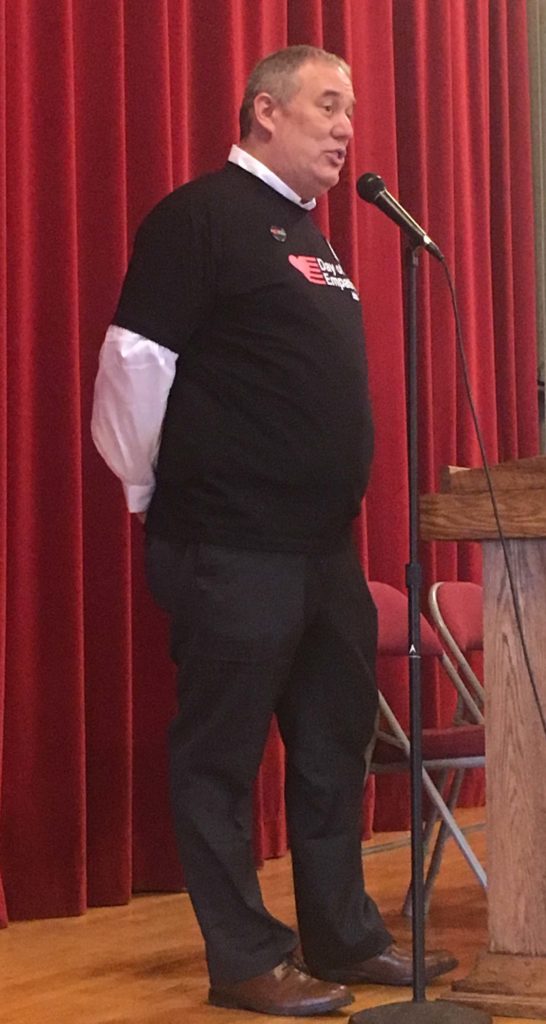I walked into my first Day of Empathy event nearly four years ago feeling terrified, socially averse and embarrassed. I was ashamed and had been shamed. I had only recently completed my three years of incarceration and a bit more than two years of parole and probation. The memory of being paraded, in a bright orange jumpsuit, down one of the main streets in my town and into the country court building for sentencing was still surprisingly fresh in my memory.
I left my first Day of Empathy feeling understood, accepted and united with others ready to make social and political change. I left feeling recognized as a human being.
The Day of Empathy is a nationwide event created by the organization #cut50, which was designed to bring people in power together with people impacted by our criminal justice system in order to create momentum for real legislative and social change.
When I first returned from incarceration, despite having more than 20 years of experience in higher education, I could not get a job bussing tables. I still remember the faces of every single person who interviewed me when they came to the part of the application where I admitted I had been convicted of felonies.
Only a few weeks earlier, the bulky and uncomfortable electronic monitor which, in my paranoid imagination, acted as a town cryer letting everyone else know that a person with a felony was in every room I entered was removed. During my years on parole and probation,I had to go to therapists, parole offices, and enduring police searches of my living space many times. Life on supervision was full of daily humiliations and embarrassment.
And yet, there I found myself, walking into a room full of other formerly incarcerated people. But these were formerly incarcerated people who were dressed normally, who walked with dignity, and who were speaking for themselves. In fact, this was a room full of people listening to other formerly incarcerated people speak out loud and in public about their experiences and about the good work they had been doing since they themselves returned from incarceration.
In this room, I encountered men and women who had paid their debt to society and who were making amends for the damage they had done, but who were all doing good work in their communities and speaking out about the good work that they were doing with pride.
When I looked closer, I noticed that the room was also filled with community members, legislators, and even prosecutors all listening and interacting with these formerly incarcerated activists.
Walking into that room, I learned that I did not have to live in shame. For the first time, I saw the community of formerly incarcerated people as a source of strength and inspiration. Most importantly, when I looked around this room, on this day of empathy, I saw decision-makers listening intently to what impacted people had to say.

Safe & Just Michigan Policy Analyst Josh Hoe speaking at a previous year’s Day of Empathy event in Lansing.
Even more startling to me at the time, this was a place where people who had been harmed and people who had done harm were in the same room working together to change the system for the best of everyone involved. In fact, I came to see people who had been harmed and who had done harm were often one and the same person. Many people who became incarcerated had a history of trauma and had survived crime themselves.
This is an event that exposes to everyone who attends how our language and policy are inadequate to effectively describe the problems incarcerated people, formerly incarcerated people, and victims of crime face when coming into contact with our criminal justice system.
During my first Day of Empathy, I was a volunteer.
During my second Day of Empathy, I was a speaker.
During my third and fourth Day of Empathy, I organized the event. Now, at the same time, I work as a policy analyst here at Safe & Just Michigan, where I work every day to influence criminal justice reform legislation throughout the state of Michigan. But a lot of it started by simply walking into my very first Day of Empathy event and experiencing the power that a room full of my brothers and sisters in incarceration could generate.
The fourth annual Michigan Day of Empathy event will happen on March 25, 2020. It will be held at the Central United Methodist Church, 215 N. Capitol Ave. in Lansing. The event will run from 9 a.m. to 5 p.m., and breakfast and lunch will be provided.
What will the Day of Empathy mean for you? We can make a difference together and you are the next “most important person” in the movement for criminal justice reform. I look forward to meeting you in Lansing on March 25, 2020.
Please join us on March 25, 2020, at the Day of Empathy. The event is free, but we’re requesting registration in order to prepare enough materials and food. RSVP at this link.
~Policy Analyst
Josh Hoe

